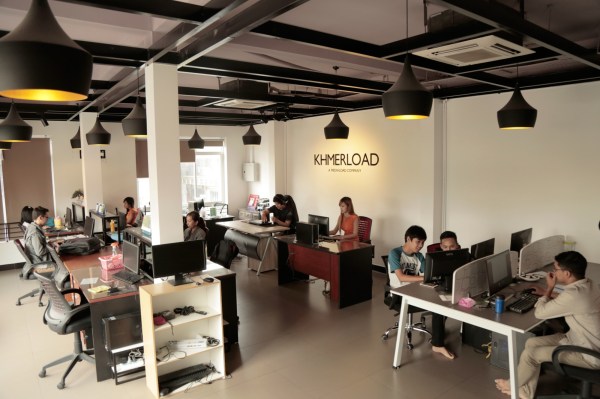Did you know Cambodia has its own BuzzFeed?
Well, now you do!
(And, yes, do note that I’m assuming you know of Cambodia and where it is located in the world.)
In a country renowned for world-famous temples and fresh, spicy food — not to mention communist politics and one of history’s most atrocious genocides — lives Mediaload, a six-year-old online media company that harbors aspirations of becoming the local language equivalent of BuzzFeed across Asia. Mediaload has news websites in Cambodia, its home country, and neighboring Myanmar, with a desire to go much further.
Cambodia, the Southeast Asian country, isn’t exactly known as a startup hotbed so you may be surprised to learn that Mediaload is hitting an impressive 56 million page views per month from a base of over seven million unique visitors. That’s across its two mainstream news sites which cover a range of topics in native languages: Khmerload (Cambodian) and Myanmarload (Burmese).
Thriving in emerging markets
Those are pretty incredible numbers. The popularity of both sites is testament to ever-increasing internet access in emerging markets over the past few years, particularly in Southeast Asia. The region’s total internet population is tipped to grow from around 260 million people today to at least 480 million by the year 2020, according to a report co-authored by Google, with 3.8 million people coming online for the first time each month. The same report estimates that the region’s online media space could reach $20 billion by 2020, thanks to a projected growth rate of 18 percent year.
With digital representing far less than five percent of advertising spend in Southeast Asia — and below one percent in some places — there’s plenty of untapped potential from a business standpoint.
But that report and those numbers just over the region’s main countries. Cambodia and Myanmar aren’t among the top six economies in Southeast Asia, which means that they frequently fly under the radar for technology companies and investors. That’s despite significant internet adoption in both countries. Facebook’s own estimates suggest Cambodia has more than five million users of the social network, out of a population of 50 million, while there are an apparent 15 million in Myanmar, which counts just over 50 million people.

The majority of visitors to the Khmerload website are on mobile devices
Mediaload’s websites are monetized via advertising. The editorial focus is on entertainment, celebrities and lifestyle, not unlike BuzzFeed, but in contrast to its U.S. role model, politics — a tricky subject for media across Southeast Asia — is off the table and has been since the start.
Primarily the content is written stories, but the company is increasing its efforts on video and multimedia which, beyond being more lucrative revenue-wise, have greater potential to go viral and growth the sites’ audiences, CEO and co-founder Vichet In told TechCrunch in an interview. The team is also looking to run more interviews and explore areas that include women’s issues and talk show topics.
Igniting startups in Cambodia
Aside from hatching a promising media business, Mediaload is celebrating after it became the first Cambodia-based startup to land investment from a U.S.-affiliated VC firm. 500 Startups announced in March that it invested $200,000 in the company via its $50 million Southeast Asia fund ‘500 Durians’ — its first investment in Cambodia. The deal values Mediaload at several million U.S. dollars, In told TechCrunch although neither the company nor 500 Startups gave an exact valuation.
That’s some way from BuzzFeed — which has raised over $440 million from investors like Comcast NBCU, SoftBank and Andreessen Horowitz — but it might just have helped put Cambodia on the map for investors in Southeast Asia.
“I wasn’t charging into Myanmar and Cambodia to make investments,” 500 Durians partner Khailee Ng told TechCrunch. “But the ecosystem has woken up in a big way.”
“Vichet can open a pathway for more entrepreneurs,” Ng added. “These countries are becoming ready for investment much faster than VCs are getting ready for them.”
U.S. PhD to Cambodian media founder
Apart from being a landmark for Cambodia’s nascent startup scene, the deal is a validation for In, who quit studying for a PhD in economics and moved home from the U.S. to develop Mediaload. While in the U.S., where he had lived on and off for five years as a student, In said he dabbled in various online business ideas, including an e-commerce project to buy-sell course books, in his spare time.
Together with his two brothers Vichea and Visal — now the company’s CTO and COO, respectively — he began the website in 2011 while at the University of Michigan. When it began to show potential, In said he realized that his true passion was startups not studying and he returned home full-time to develop Mediaload.

Left to right: Vichea In (COO), Vichet In (CEO) and Visal In (CTO)
“Back then people were shocked,” he said in an interview, explaining that his parents had been proud of his doctorate studies. “Now it’s ok” since the site has become established in Cambodia.
“In Cambodia, you can’t avoid seeing our content,” he added.
Talking to In, you might be surprised to hear that the processes behind the business are what you’d expect to hear from a media startup founding living in San Francisco, London, New York or other Western locations.
Mediaload currently employs 30 staff, 11 of whom work on the Myanmar-focused business. In revealed he is working on a employer stock program now that the business is a registered entity in Singapore, but already, he claimed, employers can earn more from performance-related bonuses than their basic salary.
That might conjure up visions of a newsroom under pressure to deliver traffic, but the Mediaload CEO said that there’s been precious little churn as his writers share his long-term goals. One-third of his writers have been at the company for over four years as it has grown its staff, he claimed.
Reliance on Facebook
Like others, Facebook is a key distribution channel, but Mediaload’s reliance on the site is beyond anything I’ve ever heard in the media world. In admitted that in Myanmar, some 90 percent of traffic comes from Facebook Instant Articles. In other words, the overwhelmingly majority of readers aren’t even leaving Facebook to visit the company’s website.
“Facebook is the internet, [people in Myanmar] use it to consume the content. They wouldn’t even click to read the news because of data consumption so we use Facebook Instant articles.”
In said that Mediaload can make “some good money” from Instant Articles, but he did admit that visitors to the company’s websites are more lucrative. The company plans to ramp up its video efforts, and begin making its own content specifically for social media and viral potential, he did admit that a reliance on a platform like Facebook is not ideal. (This is, indeed, another frustration that the Cambodia-based company has with western media firms.)
“It’s a concern for us,” he explained. “Thats why we run content on our website first, to encourage them to visit directly, but it’s a balance. You can’t abandon Facebook, it’s a huge source of traffic.”

Facebook is a critical channel for the company, particularly in Myanmar
Nonetheless, Mediaload has shown it is able to consistently grow its Facebook presence. Khmerload in Cambodia has some 3.1 million fans on the social network, while Myanmarload has 5.1 million — that’s over half of Facebook’s userbase in Cambodia and around one-third in Myanmar.
“Our objective to be beat BuzzFeed in terms of the number of Facebook followers,” In joked.
Well, BuzzFeed has just over Facebook 10 million fans, so with a few successful countries that goal might actually be possible, although overall traffic is another thing altogether.
Expansion plans
Like any other new media company, Mediaload is also focusing on new delivery and distribution mediums to reach its audiences. It already offers a Line Official Account and a Facebook chatbot, and In said that he is weighing up the merits of an app that allows users to follow news about their favorite celebrities, since that is an interest that drives its audience and traffic.
He is also considering expanding to other markets in Southeast Asia, but is very selective in doing so.
“English content is too competitive, but we see that local language content is underserved,” he explained. “We target Southeast Asia and South Asia, especially where people like to use Facebook, because we know the model can be replicated in other countries.”
Already, a pilot in Indonesia saw a local Mediaload website build a following of 400,000 fans on Facebook but In believes that it will require significant investment to grow that offering into a top five local news player. He is also currently considering possibilities in Vietnam, where he believes the company’s new focus could make an impact.

This year, In said he is steering Mediaload to a target of $1 million from advertising revenue. He declined to break that figure out into specific details although he did say that the company has been profitable almost since birth.
As with other startups that move from being bootstrapped to venture funded, however, growth is the goal for Mediaload rather than profitability in the short-term. In said that, at this point, he envisages the company needing to raise something in the region of $2 million for its next round of funding in order to develop new content, particularly around video, and move into new markets.
In deliberately targeted 500 Durians partner Khailee Ng because of his experience in media — Ng founded and exited Says.com, a community-focused media company in his native Malaysia, prior to becoming a VC — and that is the kind of investor that he said the company would look for with this next round. Easier said than done, perhaps. There are few dedicated media players in the region beyond German giant Burda, which has a focus on later stage deals such as Series B, but getting 500 Startups on board is sure to help make connections and open doors in the future.
Ng himself said that his investment has reminded him of the potential that lies within some of Southeast Asia’s less visible countries.
“Mediaload is a firm reminder that it is still so ‘Day One’ in Southeast Asia in so many ways. There’s still new ground, all the time and everywhere,” he told TechCrunch. “The market will continue to evolve and pockets of opportunities will evolve — we want to be part of that.”
Note: The original version of this article was updated with new traffic data and additional details
